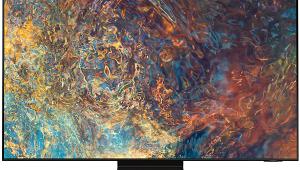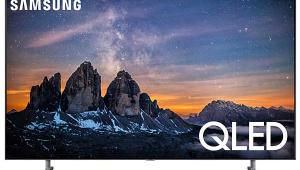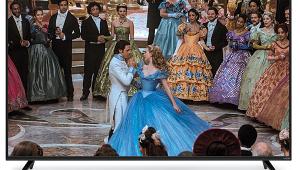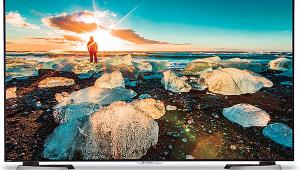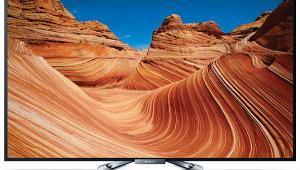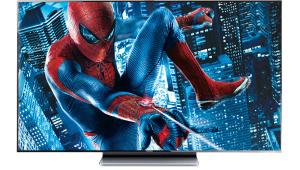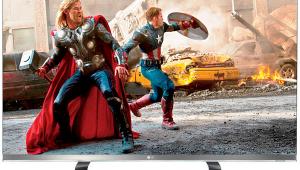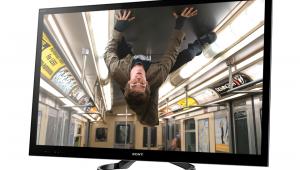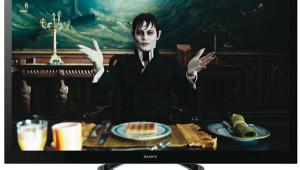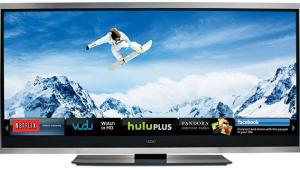Samsung LTP468W LCD HDTV
By the time you read this, Samsung's claim that their 46-inch LTP468W is the largest LCD flat-panel TV with 1080p capability will surely have been broken, perhaps by Samsung themselves. In the frenetic flat-panel HDTV category, new models seemingly appear in stores on a monthly—nay, weekly—basis. Samsung is chasing the flat-panel crown with a slew of offerings, in both the LCD and plasma categories, wowing visitors to their CES 2005 booth with dozens of new models, including a 102-inch behemoth.
 The Holy Grail of HDTV resolutions is 1920:1080 progressive, the top of the 18 ATSC-designated formats that form the digital-TV specification. Just as progressive-scan DVD players provide a better-looking picture than their interlaced counterparts, 1080p promises to eliminate the jagged-line artifacts that are the inevitable by-product of any form of interlaced display. Virtually all fixed-pixel displays—LCD, DLP, LCOS, or plasma—don't form interlaced or progressive images. Instead, they display each frame all at once, not line by line. However, the signal they receive can be interlaced or progressive. If it's interlaced, the display has to convert it to progressive and scale it to its native resolution before it can display it.
The Holy Grail of HDTV resolutions is 1920:1080 progressive, the top of the 18 ATSC-designated formats that form the digital-TV specification. Just as progressive-scan DVD players provide a better-looking picture than their interlaced counterparts, 1080p promises to eliminate the jagged-line artifacts that are the inevitable by-product of any form of interlaced display. Virtually all fixed-pixel displays—LCD, DLP, LCOS, or plasma—don't form interlaced or progressive images. Instead, they display each frame all at once, not line by line. However, the signal they receive can be interlaced or progressive. If it's interlaced, the display has to convert it to progressive and scale it to its native resolution before it can display it.
The LTP468W is not the first 1920:1080 fixed-pixel HDTV on the market, but it lays claim to being the first large-screen LCD display with a 1920-by-1080 resolution and internal upconversion that smoothes the jaggies that accompany the interlaced 1080i signal that most HDTV broadcasters favor.
The LTP468W even looks good before you turn it on. Its stylish, metal-trimmed cabinet features a slate-black screen, along with a substantial oval-shaped mounting base. Although wall-mounting is the more-usual placement for a flat panel, the Samsung's rear panel doesn't have the usual ugly patchwork of ventilation holes and exposed innards that are common to the breed, so an out-in-the-open setup can look good from any angle.
When it comes to the LCD-versus-plasma battle, each camp would have you think that their product is the better choice. In reality, though, each type has vices as well as virtues. I'm always a little leery of walking into the minefield of generalizations, but LCDs often win the light-output race, so that, even in a brightly lit room, they can typically hold their own and provide a viewable picture.
Plasmas can't yet keep up in that venue, but they come out ahead in the color-accuracy and picture-punch arenas. They have a more-CRT-like color quality and faster pixel-response time that reduces (if not outright eliminates) the smear that slower LCD panels have such a hard time with, producing a sharper visual result on fast pans and moving text. Samsung might have just moved a bit further into plasma's performance territory with the LTP468W, promising a quicker-than-average 12-millisecond pixel-response time.
 I went into the service menu to access the individual color-drive and bias settings. Good news there, as the Samsung's service menu showed the presence of Faroudja's proven deinterlacer chip, along with the Genesis scaler chip. Once I got into the measurements, I found the Samsung's out-of-the-box settings to be fairly close to ideal. It needed only minor tweaking to get the set into the correct color-temperature and gray-scale tracking zone, something an ISF technician can easily do.
I went into the service menu to access the individual color-drive and bias settings. Good news there, as the Samsung's service menu showed the presence of Faroudja's proven deinterlacer chip, along with the Genesis scaler chip. Once I got into the measurements, I found the Samsung's out-of-the-box settings to be fairly close to ideal. It needed only minor tweaking to get the set into the correct color-temperature and gray-scale tracking zone, something an ISF technician can easily do.
HT video editor Geoffrey Morrison is a hard-liner when it comes to set calibration, subtracting points for what I would consider acceptable minor deviations from the ideal. But, once we got into the grading, we agreed more than we disagreed about the Samsung's performance, giving a B+ to the deinterlacing results, an A to the color decoder, and generally high marks (although not the highest we've ever accorded) to the overall video performance.
But, just as Geoffrey's a stickler for measurements, my eye spotted the Samsung's Achilles heel when I hauled out our torture-test DVDs and D-VHS tapes. The Samsung had a tendency to veer away from grays and blacks in dark scenes, shifting to a jaundiced green. When I played a foggy, dimly lit scene from Master and Commander, the green shift cropped up regularly. I would be remiss if I didn't point out that the anomaly was quite a bit more noticeable prior to calibration. Another digital-TV bugaboo is color banding, noticeable steps in gradation when saturated colors are smoothly brightened and dimmed. The Samsung was merely good here; the color banding wasn't bad, but it was still noticeable fairly often.
Lest you think I'm damning the LTP468W with faint praise, hang on to your seats. I squinted closely at the screen looking for abnormalities in a theater-darkened viewing room with specially selected test material. Then, I turned on all the lights in the room, and voilà: LCD rules! The picture retained substantial brightness and contrast, which are plasma's comparative weaknesses. The Samsung is a great choice for a room that lacks lighting control.
If you're hunting for a big, flat-panel HDTV that can look good any time of the day in less-than-ideal ambient lighting conditions, look no further. The Samsung has the picture detail that HD material demands, and, when it comes to battles with daytime room lighting, this is the display for you. Forward thinkers (who won't mind waiting until 1080p HDTV broadcasts become the norm) will surely warm up to the LTP468W too, as it has the future-proof features they want already built in.
Highlights
• First 1920-by-1080 LCD flat panel
• Looks great turned off, too
- Log in or register to post comments
